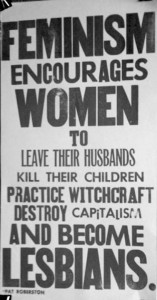You Should Care: A Call for Gender Equality
by Elisabeth Wilder – Horizon Columnist
“Are you a feminist?” My skin still crawls every time that I am asked this question. Primarily because most of the time this question is not asked in the conversational get-to-know you kind of way, like if someone were to ask me if I were an athlete, musician, or student. Rather, the question is asked as an accusation, like if someone were trying to find out if I was a communist, fascist, or a witch. Feminist is a dirty word.
Yes, I am a feminist.

This is also usually the point in the conversation where I have to dispel what feminism isn’t to try and fight the negative connotations associated with feminism. Feminism is not man hating, bra burning, lesbianism, the shaming of stay at home moms, or women who believe they are superior and deserve to rule over men. On the contrary, feminism seeks to bring social, political, and economic justice to women and men, and to free both men and women of gender barriers.
To say that I’m not a feminist or against feminism is to ignore centuries of struggle for gender equality, it assumes that the challenges faced by men and women in the past are now irrelevant. That the right for women to vote, to own property, and to receive the same education as a man came without sacrifice or work. Like denying racism, it puts our ideals under the mask of presentism, or the idea that the challenges faced in the past are no longer relevant because of society’s evolvement over time. We need feminism to face the ever-present challenges of gender inequality.
Today, women make on average $0.78 for every dollar a man makes. That means while men and women may be doing the same amount of work in the same profession, women are making less. Too often women are the target or violence, rape, and being over sexualized. Around 20% of women will be sexually assaulted before they finish college. In countless places around the world women are not allowed to be educated or work outside the home. How can we grow and evolve as a society when half the population isn’t receiving the same opportunities?
At the same time, we can’t ignore the prejudices that men face. Society teaches men that it is weak to be emotional or sensitive. Cases of rape and domestic violence that involve women beating men are often dismissed and don’t receive proper attention. Fathers who chose to stay at home with their children are viewed as unmanly or feeble for not being the main provider for the family. Most of all, the struggle for gender equality often excludes the inequalities that men face.
The road to gender equality is one of the trickiest roads to navigate. Gender is a paradox in which we acknowledge that we are different, but want equal treatment. For decades the issue has been played off as a matter of difference rather than an injustice. It has been viewed as the natural order of things because of traditional male and female traits. Gender inequalities are not derived from the natural differences between men and women, but from how society has chosen to limit genders to specific roles and chastised and persecuted those who didn’t fit into the roles.
What began as a movement for women to have equal political, social, and economic status as men, has transformed into a movement in which both genders are no longer confined to a standard way of doing things. This is what feminism is, the pursuit of gender equality. With gender equality, both men and women are welcome to be emotional and sensitive or to be assertive and strong. Both men and women should be free to pursue a career or be a stay at home parent. Feminism seeks to eradicate the idea that one gender needs to be in control and the other controlled, and instead promotes relationships of mutual partnership. It frees us from the imprisonment of stereotypes, preconceived ideas, and defined roles. Feminism is for everyone, men and women, who believe in a society where our gender shouldn’t be what defines our career, personality traits, or characteristics.
So, are you a feminist?
Elisabeth Wilder’s column, “You Should Care” will explore current events and issues and will appear in each issue of the Horizon. Elisabeth is a sophomore disaster management major.


